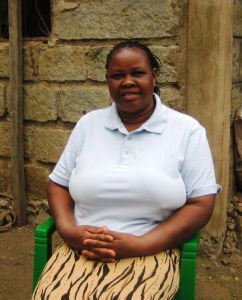What happens after a World Vision project closes?
Have you ever wondered what happens after World Vision projects close? Do the community keep up the good work we started together 15 years before? Hilary, a member of staff from World Vision UK, travelled to Kenya to find out:
My name is Hilary and I work for World Vision in programme quality – making sure programmes funded by World Vision UK have a positive impact on children, their families and communities.
I am in Kenya for three weeks to support a programme evaluation of an Area Development programme (Kimorori ADP) that started in 1991 and closed in 2006. Over the past two weeks, I and community members from Kimoroi, as well as World Vision Kenya staff, have been assessing which projects have kept going and made a difference to families, and which ones have not been so successful.
Former sponsored children succeed in life
I met Joyce, a former sponsorship coordinator, who lives in Kenol, a small town, not too far from Thika where Del Monte grow a lot of their pineapples. Joyce previously used to check the health and education status of sponsored children. Every three months she would check on their progress.
The former sponsored children have progressed in their careers. One has become a University lecturer, many have degrees and one is working at Kenya Power and Lighting. I could see the satisfaction on Joyce’s face as she told me these stories.
One former sponsored child, Antony, is part of our World Vision evaluation team; he is responsible for finding out from community groups what changes have taken place amongst the farmers. Antony (on the right below) told me how he was chosen to be sponsored because he came from a poor family with 12 children; he and his twin sister were sponsored. Because of this, he completed secondary school and gained a government grant to go to university where he studies agricultural economics.
What struck me most about Anthony was the way he talked about his siblings; “they look up to me as they have seen what I have achieved, they want to copy me." Being a role model for his siblings is a wonderful responsibility and one that Antony acknowledges has come about because of the teaching he received from World Vision. “World Vision taught us about moral values and this gave me hope. Many children who did not have this opportunity lost hope and dropped out of school.”
“World Vision taught us about moral values and this gave me hope. Many children who did not have this opportunity lost hope and dropped out of school.”
Throughout the two weeks, we met with parent teacher groups (PTA), parents, water management groups, famers, community leaders and district government officials. Our aim was to try and understand what had changed for people over the seven years, why this change had happened and whether World Vision had contributed to it.
Water
We found the water points were functioning; people had access to water, including poor families. These water points however were not always well managed because during 2005, Kenol, the centre of the district where World Vision was working, had become a district centre. This brought with it improved roads, an increase in the population and therefore an increase in demand for services. The water management committees were faced with challenges that had not been anticipated during the project’s lifetime.
This was disappointing, although from our conversations, it was clear that the majority of people had access to water closer to their homes than before. However the management of these supplies needs to be improved.
Food security
Successes were observed in food security. The most noticeable were the goat raising and mango growing projects. People have been able to successfully raise goats, use the milk and sell the offspring to improve their diet and income. Many stories from individual farmers, who had made use of the agriculture training from World Vision, highlighted that food security for the community had increased.
I met with a group of village elders who described that farmers were now able to grow more food for their families.
Education
The increase in population in the area has meant that teachers have been under more pressure – having larger class sizes. School enrolment rates have gone up which has meant the amount of time a teacher can give to students is more demanding.
The PTA groups were very clear about their vision, their commitment to the students and achieving good exam results. Their passion showed as we discussed these challenges.
Our conclusion
This process has provided evidence of what works and what doesn't in our programmes. Overall from the discussions and analysis of the data collected, we found that around 60% of the project activities have been sustained over the last seven years. This means that we identified activities that are not doing as well as we would like them to, especially in the area of water management. This was partly caused by external factors and partly due to our inability to plan for transition early enough.
A lot of success stories of projects making a lasting difference in these communities
On the other hand, we have seen a lot of success stories of projects making a lasting difference in these communities. Former sponsored children are succeeding in life, more children are getting an education and food security has significantly improved. This is due to the training and capacity building projects provided by World Vision, the commitment of the communities to their own development and the government support to improving education and health in Kimorori District.
All of the findings will be shared and utilised by our Area Development Programmes so that World Vision becomes better at supporting the sustainability of child well-being.



